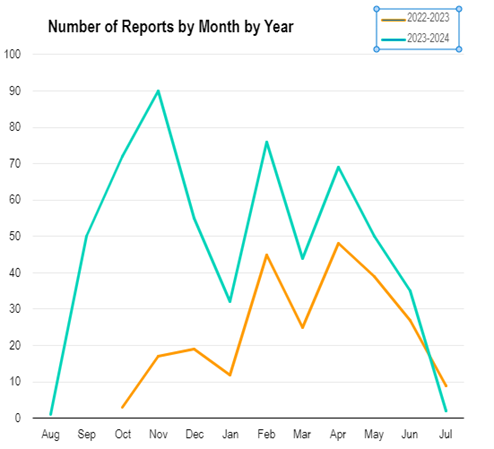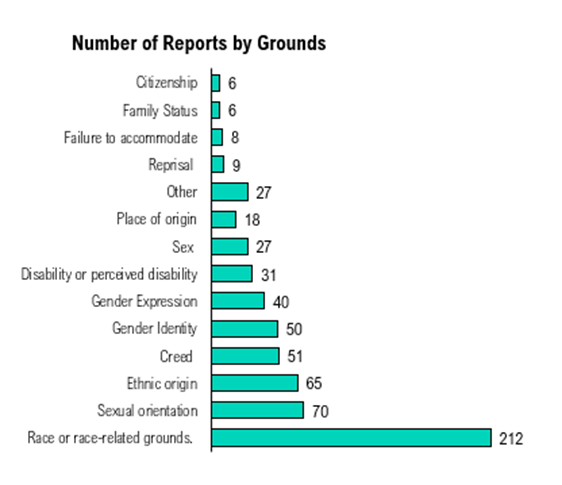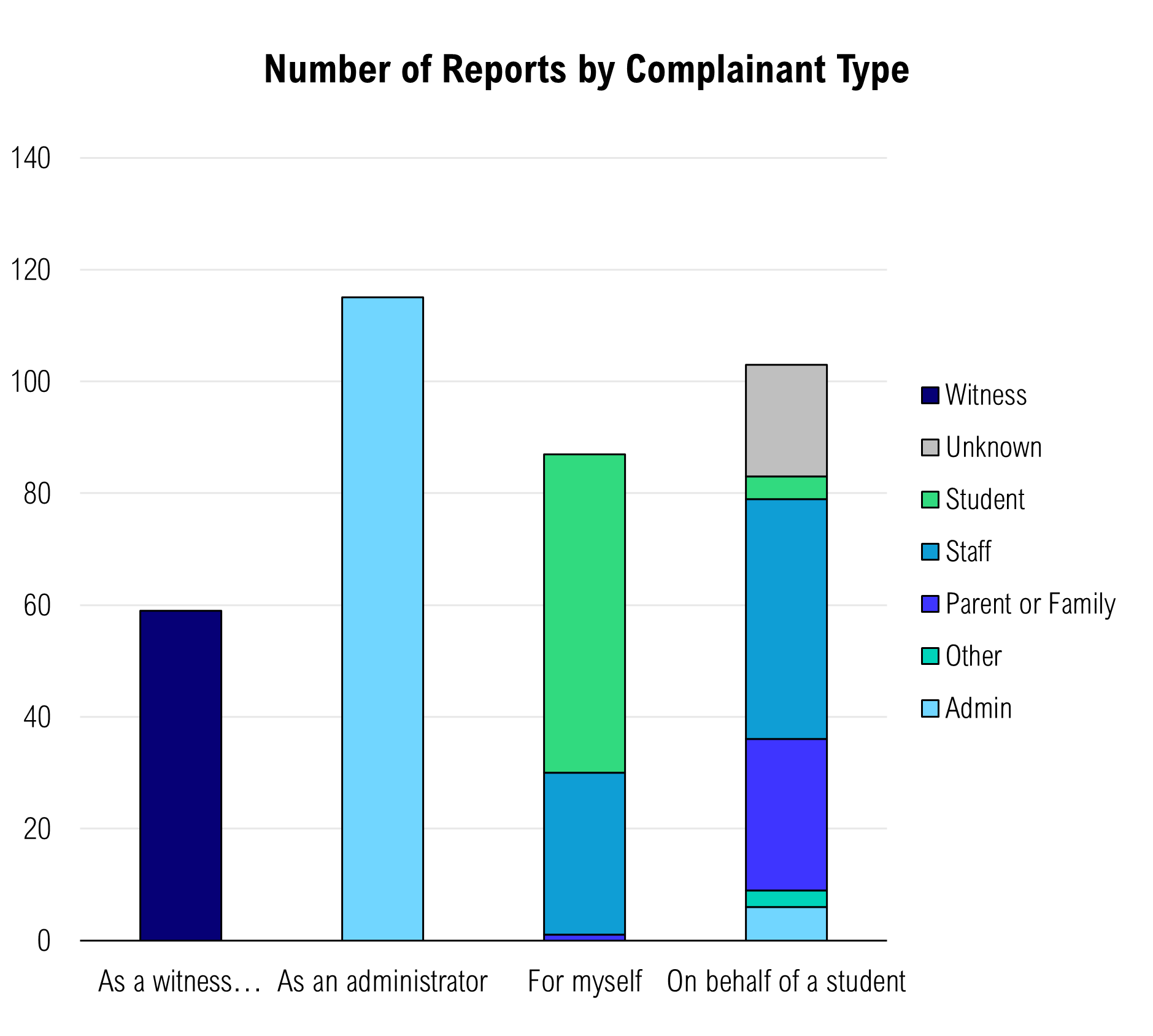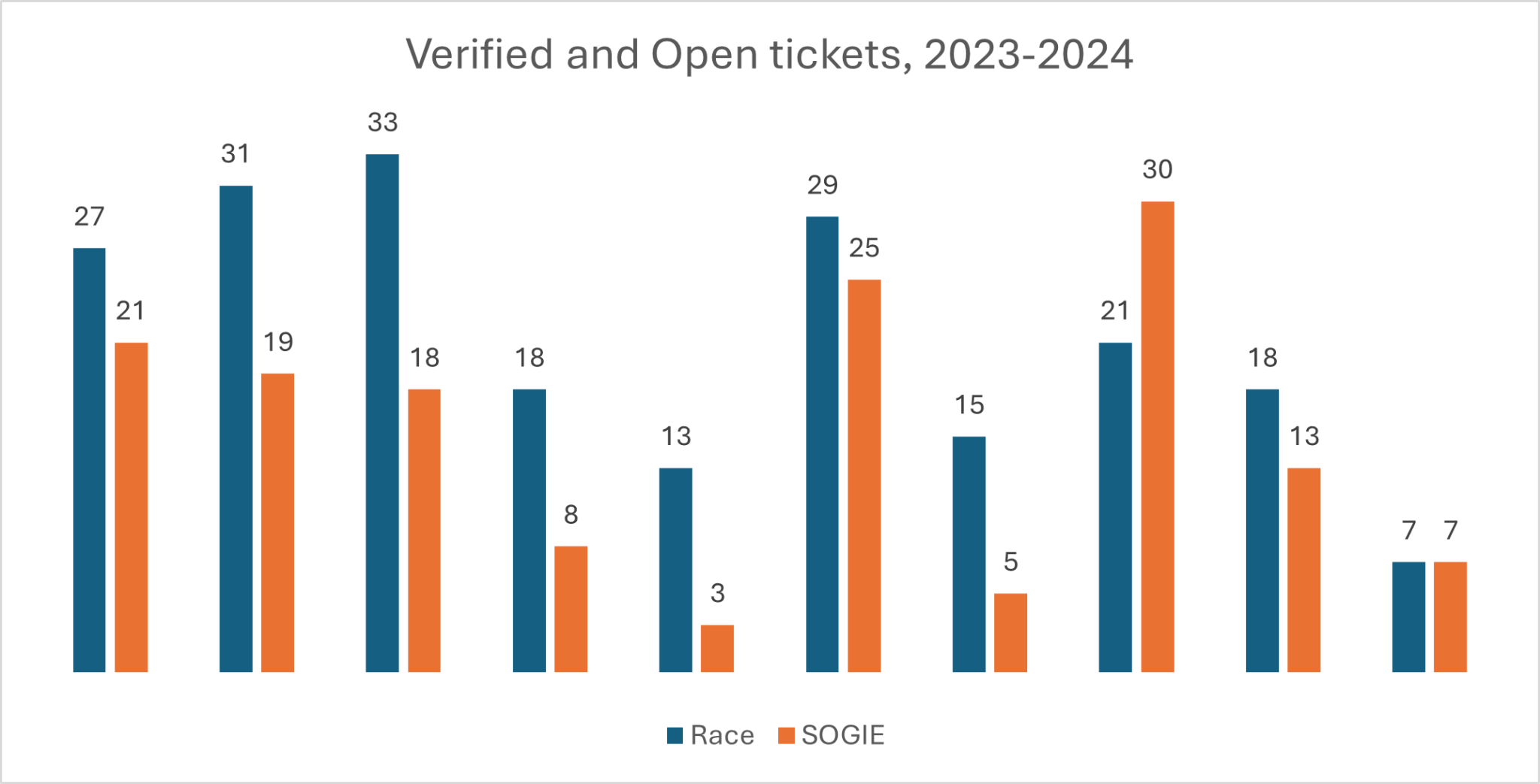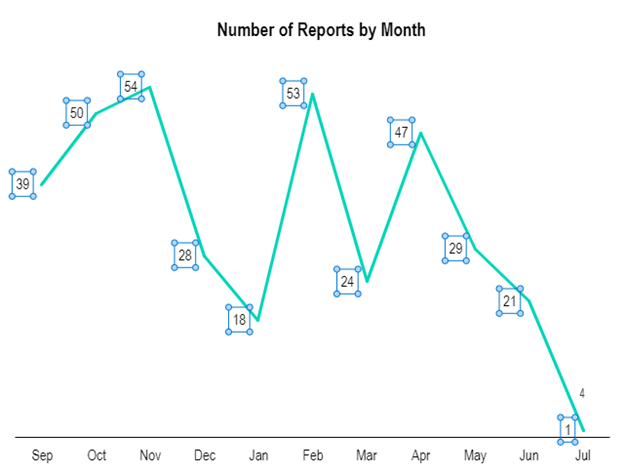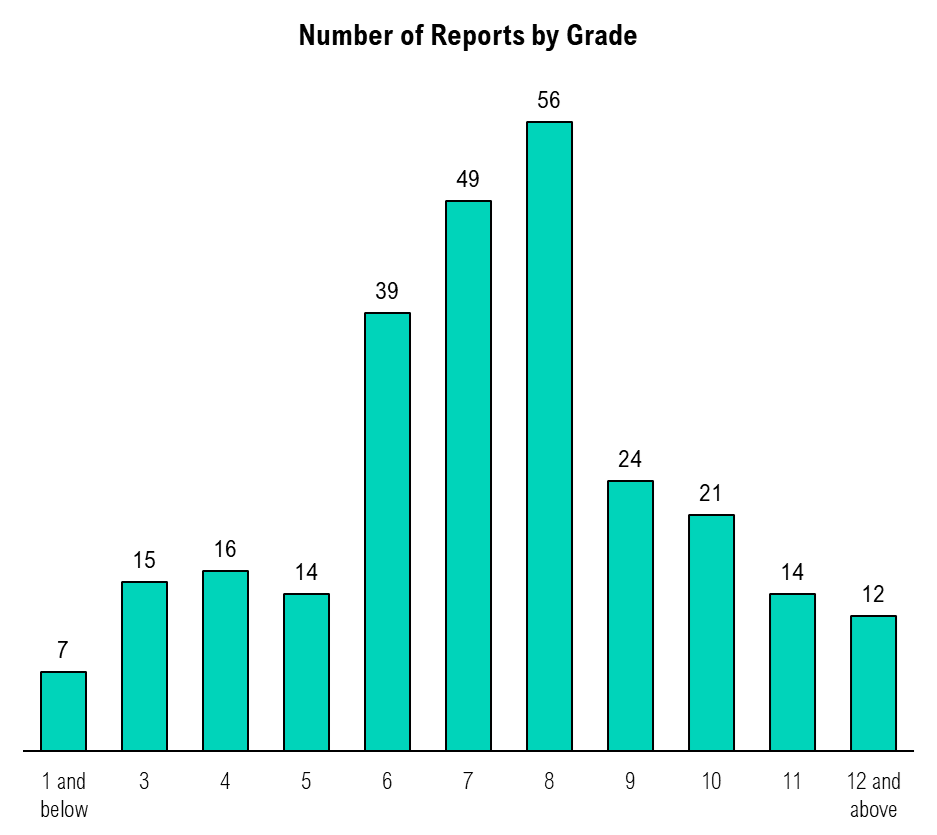The Limestone District School Board (LDSB) Student Human Rights Reporting Tool, launched in October 2022, helps students, parents/guardians, caregivers, and staff report human rights concerns involving LDSB students. This tool supports a welcoming and inclusive school environment by addressing issues like discrimination, harassment, and other human rights violations. The goal of this report is to share information about human rights reports and investigations within the board. Reporting, investigating, and analyzing human rights data help us meet our obligations under the Ontario Human Rights Code. This report also includes other important LDSB data like the Student Census 2020 reports and School Climate data.
Reports Summary
The Human Rights Reporting Tool tracks reports from submission until the investigation is complete. Below is a description of all reports to date.
- Total Reports: 576
- Verified Human Rights Reports: 294. These reports are confirmed as human rights violations after investigation.
- Under Investigation: 70. These reports have not been investigated yet, or the follow-up process was not completed before the end of the 2023-2024 school year.
- Other: 212. These are reports that do not meet the criteria for human rights concerns but may still involve important issues, such as bullying or safety concerns.
The data shows both successes and challenges. While most reports have been checked and resolved, the 70 open tickets indicate that some issues are still not resolved and additional follow up was needed. There are 337 reports that were started but not finished, which could suggest a range of explanations for incomplete submissions.
Response to Human Rights Reports
Many reports are being labeled as "Other," which shows we need a better way to report issues. Students, parents, and caregivers are using the Human Rights Reporting platform to report problems or issues that are not violations of human rights. This shows that people in the Limestone community need a safe and clear way to report any concerns or potentially confusion between this reporting mechanism and the School Safety Reporting Form. The board continues working on these tools and distinguishing between them so that all reports go to the right department quickly and easily.
The board has taken steps to address some of the human rights issues reported. For example, LDSB released a guide on the use of the N-word to stop its widespread use. According to the LDSB Student Census (2020), 3% of Limestone students identify as Black,[1] and 44% of all verified human rights reports were about anti-Black racism. Most of these reports involved the use of the N-word. The board also released a guide to help teachers choose appropriate texts for the classroom and provided a support video to all students, families, and staff focused on explaining the Ontario Human Rights Code.
In response to reports about student athletes, there have been sessions focused on human rights lessons with the Kingston Area Secondary Schools Athletic Association (KASSA). The board is creating learning modules for students named in human rights reports and giving more support to affected students. LDSB has also started a human rights and equity learning series for teachers to help them understand these issues better and reduce the number of reports. Lastly, there have been focused efforts at certain schools, where the Human Rights and Equity Advisor and Equity Curriculum support teachers have worked with school leaders and school staff to address human rights concerns revealed by the reporting system.
General Comparison Data
Since October 2022, the system has logged 820 reports. There was an increase in the 2023-2024 school year, with 576 reports compared to 244 reports in 2022-2023. This increase might be because of the board’s educational campaign focused on educating all members of the LDSB community about the Ontario Human Rights Code, and better advertising and awareness of the Student Human Rights Incident Reporting Tool.
Ground | 2022-2023 | 2023-2024 | Grand Total |
Race or Race-related Ground. | 92 | 266 | 358 |
All Sexual Orientation, Gender Identity and Expression (SOGIE) Grounds | 59 | 130 | 189 |
Other | 58 | 98 | 156 |
Ethnic Origin | 29 | 95 | 124 |
Creed (Religion or Faith) | 25 | 69 | 94 |
Disability or Perceived Disability | 21 | 67 | 88 |
Sex | 26 | 47 | 73 |
Reprisal | 14 | 30 | 44 |
Place of Origin | 7 | 27 | 34 |
Failure to Accommodate | 12 | 26 | 38 |
Family Status | 9 | 17 | 26 |
Age | 9 | 12 | 21 |
Citizenship | 2 | 10 | 12 |
Marital Status | 3 | 7 | 10 |
Total Reports[2] | 244 | 576 | 820 |
Monthly Trends
There were spikes in reporting in February and April for the 2022-2023 and 2023-2024 school years, as well as November 2023-2024.
Notable Increases in Reports by Human Rights Grounds
All reports include human rights “grounds:” the protected areas under the Ontario Human Rights Code. The table below shows the grounds that had notable increase in reports between the 2022-2023 and 2023-2024 school years.
Ground | 2022-2023 | 2023-2024 | Percent Increase |
Ethnic Origin | 29 | 95 | 4.6% |
Disability or Perceived Disability | 21 | 67 | 3% |
Creed | 25 | 69 | 1.7% |
Race and Race-related Grounds | 92 | 266 | 8.5% |
Place of Origin | 7 | 27 | 1.8% |
Citizenship | 2 | 10 | 1% |
The increase in reports about race, ethnicity, and creed, especially related to international conflicts, shows how global events affect local school environments.
Analysis of Increase in Reports
The increase in total reports from 2022-2023 to 2023-2024 is important and needs more attention. One main reason for this increase seems to be the targeted awareness campaign, like launching a human rights video, putting up posters in schools with a QR code to access the form, and more outreach by the Human Rights and Equity Advisor and Equity Curriculum support teachers. These efforts have made it easier for students and staff to report incidents, leading to more reports being submitted.
Among reports with a recorded grade[3], about half (48%) of all reports in 2023-2024 involved students in Grades 6, 7, and 8, with a significant increase in reports involving Grade 8 students (7%). This shows that middle school students are especially affected by, or aware of, human rights issues. This trend highlights the importance of continuing to support and educate younger students on their rights and the reporting process. There were also increases in reports involving Grade 3 students (3% increase) and Grade 11 students (5% increase).
Detailed Breakdown (2023-2024 School Year Only)
For the following sections, only verified human rights reports and open investigations from the 2023-2024 school year are included. When the numbers are too small, the data has been combined or mentioned in the text only to protect the privacy of those who reported.
Human Rights Grounds
- Race or Race-related Grounds:
- Total: 212
- Analysis: Race-related concerns are the most common human rights issue, showing the ongoing challenges of dealing with racial discrimination. The high number of verified reports suggests that racial discrimination is common and needs continuous, targeted actions, like anti-racism education and support systems. This data matches the LDSB Student Sense of Belonging Report, which showed that students from certain racial groups feel less positive about their school environment.[4]
- SOGIE:
- Total: 99 [5]
- Analysis: The large number of SOGIE-related reports shows the need for inclusive policies and practices to support 2SLGBTQ+ students. The data indicates that these students still face challenges, highlighting the importance of inclusive lessons and accessible counselling services.
- Creed:
- Total: 51
- Analysis: The increase in creed-related reports, including incidents of antisemitism and Islamophobia, shows how global events affect school dynamics. This highlights the need for schools to promote understanding and respect for different beliefs.
- Disability or Perceived Disability:
- Total: 31
- Analysis: The increase in disability-related reports might show that people are recognizing the need for better accommodations in schools. Making sure students with disabilities get the support they need is important for creating an inclusive learning environment. Schools must follow accessibility standards and provide the necessary resources and training for staff to support these students effectively.
- Failure to Accommodate:
- Total: 8
- Analysis: Even though there are fewer of these reports, they show areas where schools might need to improve in meeting different student needs. This highlights the importance of taking proactive steps to make sure all students get the right accommodations.
- Sex:
- Total: 27
- Analysis: Reports about sex highlight issues of sex-based discrimination and harassment, with all reports involving female students. This shows the need for more ongoing education about sex-based discrimination and how it appears in our schools.
- Reports were also filed on Age and Marital Status grounds.
Complainant Data
The Human Rights Reporting Tool asks users to select their role in the school community: a witness, an administrator, staff, student, and family member.
- Witnesses to hate activity in the school community: 59
- Administrators: 115
- Self-Reports: 86
- Staff: 29
- Student: 57
- Reports on Behalf of Students: 97
- Parent or Family: 27
- Other: 3
- Staff: 43
- Student: 4
- Unknown: 20
Number of Reports by Complainant Type
Analysis: The involvement of administrators and staff in reporting shows a proactive approach within the school board, making sure human rights concerns are quickly identified and addressed. The number of self-reports and reports on behalf of students are good signs that the reporting system is accessible and trusted by the school community. However, there should be ongoing efforts to ensure that members of the LDSB community keep using the reporting system.
Staff Respondent Data
- Principal/Vice-Principal: 11
- Other School Staff: 22
Analysis: Reports involving school staff show the importance of leadership accountability in addressing human rights concerns. Training and clear guidelines for staff behavior, along with transparent investigation processes, are essential to maintaining trust and integrity within the school community. The data shows that most reports related to staff involve issues of disability, race, and failure to accommodate, highlighting the need for continuous professional development and clear guidelines to prevent discrimination.
Monthly Submission Data
Verified and Open Tickets 2023-2024
- Race or Race-related Reports:
- September: 27
- October: 31
- November: 33
- December: 18
- January: 13
- February: 29
- March: 15
- April: 21
- May: 18
- June: 7
- SOGIE Reports: Followed a similar pattern, with spikes in February and April.
- September: 21
- October: 19
- November: 18
- December: 8
- January: 3
- February: 25
- March: 5
- April: 30
- May: 13
- June: 7
Number of Reports by Month
Analysis: The increase in reports during the first months of the school year might be due to the launch of the human rights video and increased awareness efforts. The data suggests that awareness campaigns have a big impact on reporting behavior. It is important to note that there were similar spikes in the 2022-2023 school year, as shown in the Response to Human Rights Reports. The recurring spikes in February and April suggest that certain times may be better for reporting due to specific events or increased awareness, like cultural or identity-related observances. It is also worth noting that February and April are the only months where reports related to SOGIE are the same or higher than reports related to race. This pattern highlights the importance of continuous and strategic awareness efforts throughout the school year. Besides the months of September to November, where the increase in reports might be explained by the launch of the human rights video and posters, February and April are the only other months with the same number of reports.
Anonymity
- Anonymous Reports: 56
Analysis: The presence of anonymous reports shows that while some people feel comfortable reporting issues, others may still worry about confidentiality and possible consequences. Making sure the reporting process feels safe and supportive is crucial to encouraging more people to come forward. Keeping complainants anonymous has allowed the board to receive 56 human rights complaints that we might not have received otherwise.
Complainant Grade
- Grades 6 to 8: These grades had the highest number of reports.
- Grade 6: 39
- Grade 7: 49
- Grade 8: 56
Number of Reports by Grade
Analysis: The high number of reports involving students in Grades 6 to 8 shows that these years are important for addressing human rights issues. Students in these grades are especially vulnerable to problems like bullying and discrimination, so it is essential to provide specific interventions and support systems.
Reports on Race and Creed
- Race
- Anti-Asian Racism: 20
- Anti-Black Racism: 132
- Anti-Indigenous Racism: 4
- Antisemitism: 21
- Creed
- Antisemitism: 27
- Islamophobia: 14
- Anti-Indigenous and Anti-Sikhism were also reported (3 total)
Analysis: The data shows concerns focused on racial and religious discrimination in the school system. It indicates that anti-Asian racism needs specific attention from the board. The high number of anti-Black racism reports calls for targeted anti-racism education and supports. Data from the LDSB Student Sense of Belonging Report (2020 Student Census) showed that Black students report the highest levels of feeling unwelcome or uncomfortable at their school (23%) because of their race, cultural background, or skin color.[6]
While there has been an increase in reports of antisemitism and Islamophobia due to recent global events, the Student Sense of Belonging Report (2020) showed that Jewish students report the highest levels of feeling unwelcome or uncomfortable at their school because of their religion or faith (18%), followed closely by Muslim students (13%).[7] Discrimination based on creed is an issue that needs to be addressed in schools to ensure a safe and inclusive environment for all students.
Conclusion
The increase in human rights reports from 2022-2023 to 2023-2024 shows that awareness and education efforts are reaching the Limestone community. The data also shows ongoing challenges, especially with issues related to race, SOGIE, and disability. Continued monitoring, education, and policy development are essential to make sure all students feel accepted and respected in their learning environments. The LDSB is committed to creating an inclusive and fair school experience for every student, and the insights from these reports will guide ongoing efforts to improve the system and support students effectively.
Resources:
[1] LDSB Student Sense of Belonging Report, April 2023, pg. 38
[2] The total number of reports is less than the summation of each human rights ground reported because complainants can select multiple grounds when they submit a report.
[3] All demographic information requested in the form is optional.
[4] LDSB Student Sense of Belonging Report, April 2023. Students who identify as Black; South Asian and White; Indigenous; and Latine are experiencing notably less positive school climate than students who identify as White, pg. 16.
[5] Complainants selected Sexual Orientation 70 times; Gender Identity 50 times; and Gender Expression 40 times, with 43 reports including one or more of these grounds.
[6] LDSB Student Sense of Belonging Report, pg. 22.
[7] LDSB Student Sense of Belonging Report, pg. 23
Kindergarten Registration
Discover Kindergarten in Limestone and register your student for the 2026-2027 school year today!



